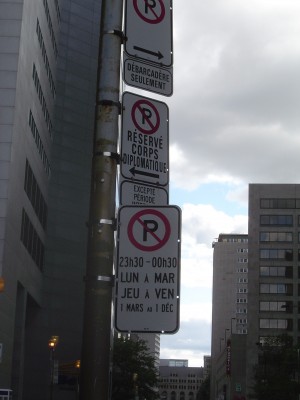
Notes from North of 49ºN
A recent Globe and Mail article by John Ibbitson states that Québec has immigration policies that hinder diversity and that the province lacks cultural integration. He starts by comparing Ottawa in Ontario and Gatineau, just across the river in Québec. The former has 19% of the population being a visible minority, while the latter has 6%.
Québec is allowed to set it own immigration policy. I knew this to be the case in 1992, as when I filled out my paperwork to visit at McGill, I had to have documents for Canada and Québec. The policies for immigration favours French speakers and those willing to integrate into Québec society. This tends to work against potential immigrants from China and India who are much more likely to have English-speaking skills or intentions to obtain them. Compounding the matter is that the province doesn’t have the resources to help immigrants integrate into Québec society, along with cultural clashes, such as a niqab-wearing woman getting kicked out of a government-funded CÉGEP French language class.
Ibbitson also makes the curious allegation that francophone sending regions tend to be impoverished areas which aren’t the most “vibrant regions,” when compared to China and India. He goes on to argue that the lack of immigration will cause cities in Québec to start dying. This is an elitist argument couched in pragmatics.
What Ibbitson fails to recognize is the context in which Québec immigration policy takes place. Québec contains a distinct culture, but within a predominantly anglophone nation. Historically, the Québec experience is one that exists within and at times resists the dominant cultural order of anglophone Canada. The immigration policies are meant to preserve the cultural order in Québec in light of this, but it puts immigrants in a bind. Immigrating to Québec means living in a region with a distinct culture that’s a minority within the nation of Canada. That’s a double-whammy or perhaps better termed, double-jeopardy. This “disincentivizes” immigration to Québec, reflecting the difficult terrain where culture, region, and nation intersect.
Within this era of globalization, can Québec realistically preserve its culture through its various policies? I’m not sure I have the answer to this, but I feel that Québec needs to figure this issue out on its own, for better or worse, despite my federalist tendencies. While there may be delicious irony in pointing out that Québec, which has brought upon bilingualism to Canada, appears to be closed to multiculturalism; the more interesting issue is how to foster better economic integration. Montréal is becoming increasingly diverse, with the immigrant population projected to go from 21% in 2006 to 31% in 2030, although these percentages are below the percentages of other major Canadian cities. The main problem is one of jobs. Despite immigrants oftentimes having better qualifications than native Quebeckers, they lack the networking with the francophone majority and subsequently face much higher unemployment rates.
I don’t see much point in encouraging more immigration to Québec if policy doesn’t address the issues of jobs and opportunities. Programmes that foster more economic integration of immigrants could be viewed as undermining the preservation of Québec culture, so there’s the rub.
Nevertheless, I think Ibbitson has it backwards. Rather than attracting a “better class of immigrant” from “vibrant” areas of the world, I think Québec should work on creating vibrant regions {most likely Montréal and certain areas of the Eastern Townships/Les cantons de l’est that are close to universities and open to diversity} that attract the flows of globalization, in terms of people, finance, technology, etc.
Twitterversion:: Globe&Mail’s Ibbitson says Quebec must fix its lack of diversity, but bigger issue is econ. integration for immigrants. http://url.ie/5cpv @Prof_K
Song:: Les Trois Accords-“Loin d’ici”

Comments 2
Immigration Quebec Job Opportunities • Jobs-Careers-Vacancies™ — April 11, 2011
[...] Multiculturalism, Immigration, & Jobs :: Québec Policy … I don’t see much point in encouraging more immigration to Québec if policy doesn’t address the issues of jobs and opportunities. Programmes that foster more economic … [...]
Dzianis — August 4, 2011
Thanks for good article on actual problems.